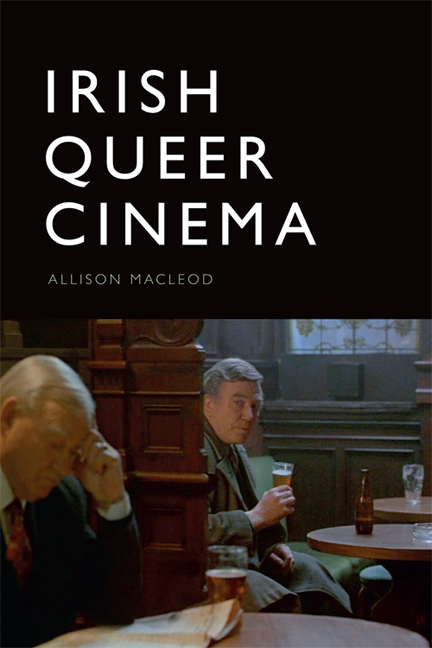Book contents
- Frontmatter
- Contents
- List of Figures
- Acknowledgements
- 1 Queerly National and Nationally Queer: Paradoxes of an Irish Queer Cinema
- 2 Mapping Ireland’s Queer Films
- 3 Re-imagined Kinship and Failed Communities
- 4 The Contested Space of the Irish Pub
- 5 Compartmentalised Cosmopolitans and Rigid Fluidity
- 6 The Queerly Productive Constraints of Rural Space
- 7 Queer Mobilities and Disassociated Masculinities
- 8 Contested Belongings within Diasporic Space
- 9 The Irish Queer Short Film
- 10 Concluding Remarks
- Select Filmography
- Bibliography
- Index
6 - The Queerly Productive Constraints of Rural Space
Published online by Cambridge University Press: 04 May 2021
- Frontmatter
- Contents
- List of Figures
- Acknowledgements
- 1 Queerly National and Nationally Queer: Paradoxes of an Irish Queer Cinema
- 2 Mapping Ireland’s Queer Films
- 3 Re-imagined Kinship and Failed Communities
- 4 The Contested Space of the Irish Pub
- 5 Compartmentalised Cosmopolitans and Rigid Fluidity
- 6 The Queerly Productive Constraints of Rural Space
- 7 Queer Mobilities and Disassociated Masculinities
- 8 Contested Belongings within Diasporic Space
- 9 The Irish Queer Short Film
- 10 Concluding Remarks
- Select Filmography
- Bibliography
- Index
Summary
The previous chapter revealed that as queer identities have become more visible in Irish cinema, they are frequently incorporated within urban narratives. These urban queer narratives reinforce the centrality of the city to the queer imaginary whilst also signalling Irish filmmakers’ attempts to introduce new urban sensibilities that shift away from traditional rural narratives and reflect a more modern and urbanised Irish society. Much of queer theory ‘unquestionably posits an urbanised subject’ (Creed and Ching 1997: 7), with the result that the relationship between rurality and queer sexuality is often rendered insignificant or non-existent and remains under-theorised. This chapter confronts this gap by considering the queer potential of rural space, focusing on how the rural narratives of Reefer and the Model and Clash of the Ash re-imagine rural space as a queer space whilst challenging dominant cultural modes of representation linked to the Irish rural imaginary.
In Irish films and films about Ireland, the landscape has persisted as a metaphor for Irish identity. As Luke Gibbons contends, the ‘landscape has tended to play a leading role in Irish cinema, often upstaging both the main characters and narrative themes in the construction of Ireland on the screen’ (Rockett et al. 1987: 203). The metaphorical function of the Irish landscape in film can be traced back to the central role it has occupied in romantic nationalist rhetoric as the location of authentic Irishness. As Irish nationalists sought to construct an Irish identity distinct from Britain, they reclaimed and often reinvented a native Gaelic culture that existed prior to British rule. In addition to Catholicism, the Gaelic language and aspects of Gaelic culture (such as sport and music) were embraced as key markers of Irish difference in opposition to Britain. The west of Ireland, as the most distanced from the colonial capital, became representative of the purest form of Gaelic Ireland, a form uncorrupted by colonial influences and processes of modernisation and industrialisation (McLoone 2010: 137). It thus operated as a powerful national symbol within the nationalist cultural imaginary, perpetuated by Irish artists and writers for whom it signified ‘the source for the revitalising of Ireland, a landscape of both personal and national regeneration’ (Nash 1993: 91).
- Type
- Chapter
- Information
- Irish Queer Cinema , pp. 91 - 108Publisher: Edinburgh University PressPrint publication year: 2018



